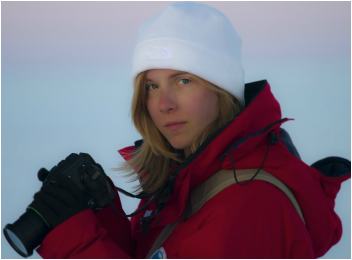Marianne Falardeau

Degrees Received
M.Sc. in Biology (summa cum laude), 2014 – Department of Biology, Laval University
Supervisors: Louis Fortier and Dominique Robert (Memorial University)
B.Sc. in Biology, 2011 – Department of Biology, Laval University
Current Position
Ph. D. Candidate (September 2014 - present)
Thesis title: The Arctic Ocean under multiple pressures: linking marine ecosystem function, services, and Inuit wellbeing
The Arctic represents something unique in each of our minds. This frozen world, crucial habitat of emblematic species, feeds the imagination of kids, and still constitutes a mystic place for many adults. But most people are so far removed from North Pole that they are uninformed of the major issues reshaping its face. The Arctic is a bellwether of climate change, where the effects of global warming are at their most intense. The ice cover is rapidly diminishing and might completely disappear in summer within the next decade, with cascading effects on ecosystems. Moreover, oil and gas industries are shifting their focus towards the Arctic Ocean that contains more than 20% of the planet’s remaining hydrocarbons. Mining industry is also growing rapidly all around the Arctic Circle, while shipping is increasing due to these proliferating industries and the opening of the Northwest Passage.
The Arctic has long fascinated me, and I am interested in understanding how increasing pressures may trigger various and potentially synergistic impacts on marine ecosystem services and human well-being. Indeed, Arctic marine ecosystem services are crucial for the well-being for people in- and out-side the Arctic. For instance, it provides food to many Indigenous communities who depend directly upon the marine wildlife for subsistence and economic activities, while its cooling effect on the Earth’s climate benefit all societies.
In my Master’s thesis, I studied how climate-related invasions of boreal fish species in Arctic waters could lead to rapid changes in the marine food web. These findings raised many questions to my mind about how changes in the Arctic marine ecosystem unfold. Do they interact? If so, can they cause social-ecological feedbacks? What are their implications for northerners? To answer some of these questions, I developed an interdisciplinary PhD research to study the Arctic marine ecosystem and the benefits - or ecosystem services - it provides to northerners in the context of environmental changes. Arctic change will have ecological and social impacts that can interact in complex ways. To untangle those interactions, I am using adapting an integrated social-ecological approach to the Arctic context.
In addition to communicating with other scientists, I frequently engage the public on these issue. I hope to contribute to increasing public awareness about the important issues surrounding the Arctic and their implications in and outside the Arctic.
Selected Awards and Scholarships
· W. Garfield Weston Foundation - Doctoral scholarship in Northern Research (2017-2019)
· Canada's Clean 50 Award, Emerging Leader
· In the Top 30 leaders in sustainability under 30 of Canada, Magazine Corporate Knights and IMPACT! Youth Program
for Sustainability Leadership (2016)
· Doctoral scholarship, NSERC CREATE in Environmental Innovation (2015-2018)
· Doctoral scholarship, Fonds de recherche du Québec - Nature et technologies (2014-2017)
· Excellence grant, Anne Vallée Ecological Fund (2014)
· Finalist of the scientific outreach contest Cogito, AELIÉS, Laval University (2013). Video here.
· Young Scientist Forum Funding, University of Tromsø, Norway (2013)
· Northern Scientific Training Program, Indian and Northern Affairs Canada (2013-2018)
· Student Involvement Distinction (scientific journalism), Student Life Office, Laval University (2011)
Peer-reviewed publications
Falardeau M, Raudsepp-Hearne C, Bennett EM. 2018. A novel approach for co-producing positive scenarios that explore agency: case study from the Canadian Arctic. Sustainability Science, DOI: https://doi.org/10.1007/s11625-018-0620-z
Falardeau M, Bouchard C, Robert D, Fortier L. 2017. First records of Pacific sand lance (Ammodytes hexapterus) in the Canadian Arctic Archipelago. Polar Biology 40: 2291. DOI: 10.1007/s00300-017-2141-0.
Pepin P, Robert D, Bouchard C, F. Dower J, Falardeau M, Fortier L, Jenkins GP, Leclerc V, Levesque K, Llopiz JK, Meekan MG, Murphy HM, Ringuette M, Sirois P, Sponaugle S. 2015. Once upon a larva: Revisiting the relationship between feeding success and growth in fish larvae. ICES Journal of Marine Science 72: 359-373. DOI: https://doi.org/10.1093/icesjms/fsu201
Falardeau M, Robert D, Fortier L. 2014. Could the planktonic stages of polar cod and Pacific sand lance compete for food in the warming Beaufort Sea? ICES Journal of Marine Science 71: 00-00. DOI: https://doi.org/10.1093/icesjms/fst221
See a full publication list here, and click here for a list of my oral presentations.
Career-related experience
Research Professional, ArcticNet (2014)
Research Professional, Takuvik Joint Program and French Polar Institute IPEV (2013-2014)
Teaching Assistant in Invertebrate Zoology and Physical Oceanography, Laval University (2013)
Young Scientist Forum Workshop, ARCTOS, University of Tromsø (2013)
Guide in marine ecology, Group of Research and Education on Marine Mammals, GREMM (2012)
Research Assistant, Quebec-Ocean (2009-2011)
Scientific missions
Community consultations, Cambridge Bay, Nunavut (2017, 2018)
Arctic char monitoring program, Department of Fisheries and Oceans Canada, Nunavut, Canadian Arctic (2015)
R/V Martin Bergmann scientific cruise, Queen Maud Gulf and Dease Strait, Canadian Arctic (2015)
CCGS Amundsen, ArcticNet, Canadian Arctic and Greenland (2014)
Astrolabe icebreaker and Dumont d’Urville Station, French Polar Institute, Antarctica (2014)
CCGS Amundsen, ArcticNet, Canadian Arctic and Greenland (2013)
CCGS Amundsen, ArcticNet, Hudson Bay and Canadian Arctic (2010)
Selection of other activities
Science communication and outreach (Various activities)
Chair (2017-18) and Board member (2015-present), Association of Polar Early Career Scientists, Canada's committee (APECS Canada)
Co-organizer, Intercultural Indigenous Workshop
2017 edition: “Sharing perspectives and experiences on research in Canada’s North”, November 16th and 17th, McGill University
2016 edition: “Scientific and local knowledge in Northern Research”, April 8th, Université de Montréal
Interests:
Scuba diving, trekking, yoga, trail running, playing music, science communication, reading, photography, filmmaking and traveling.
Contact information:
[email protected]
Professional website
